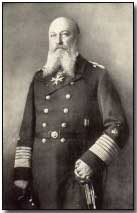Primary Documents - Alfred von Tirpitz on German Declaration of Naval Blockade of Britain, 4 February 1915
 Reproduced below is Admiral
Alfred von
Tirpitz's view of the decision by
Hugo von Pohl to
announce, on 4 February 1915, a German naval blockade of shipping
to and around Britain.
Reproduced below is Admiral
Alfred von
Tirpitz's view of the decision by
Hugo von Pohl to
announce, on 4 February 1915, a German naval blockade of shipping
to and around Britain.
Tirpitz, the Naval Minister, outlined his view that the decision was somewhat premature but that, once taken, it should have been regarded as final. In the event the German government rescinded the declaration following the protest of the U.S. government.
The following text is taken from the Von Tirpitz Memoirs (1919, Dodd, Mead & Co.).
Admiral Alfred von Tirpitz on the German Naval Blockade of Britain, 4 February 1915
The historical decision to make a war zone around the United Kingdom and Ireland was arrived at on the evening of February 2nd in a conference between von Pohl and the Chancellor with the consent of the Foreign Office, in the presence of the Minister of the Home Office, and apparently without opposition from the Grand General Staff.
Von Pohl obtained the consent of the Chancellor, who was still sadly unconversant with the world conditions and our own submarine power and then on February 4th sprang his prepared draft of the declaration of the Emperor while sailing through Wilhelmshaven Harbour.
It was disloyal of von Pohl not to consult beforehand with the Secretary of State as to the wording of the draft. He was also disloyal to me as he had always previously sought my advice in reaching critical decisions. I was entitled to this.
His act was, on the whole, the product of boundless vanity. He wished above all that the declaration should be made over his name, and February 4th was the last date on which this could be done, for on that day he took over the command of the High Seas Fleet and was already, strictly speaking, no longer chief of the naval staff.
So, against my advice and on the decision of Bethmann-Hollweg, submarine war was to begin, threatening every ship sailing in the direction of Great Britain and Ireland. Unless the dignity, and therewith the power, of the empire was to be seriously impaired and the confidence of the enemy fatally strengthened, there was nothing for it now but to stand fast.
In the face of the whole world, seriously and with a flourish of trumpets, as it were, the declaration, in my opinion so premature and so unfortunate, had been made.
On February 12th came America's first note of protest against submarine warfare. In a responsible bureau this could hardly have been unexpected, but to von Pohl's astonishment and chagrin it caused the Foreign Office to make an about-face in regards to the U-boat policy.
The Chancellor's representative at headquarters, von Reuter, later said that the Chancellor had been misunderstood by von Pohl. Von Pohi energetically denied the possibility of a misunderstanding, maintaining that he had carefully explained to the Chancellor the full consequence of the step.
Thus, scarcely had submarine warfare, born February 4th, drawn its first breath, when its own fathers, terrified, hastened to smother it. In my opinion we should never even have considered a modification of our submarine policy, once it was announced to the world, unless England consented to modify some of her own interpretations of maritime law during the war.
America's first protest resulted in our allowing the shell of submarine warfare to stand as a sop to the German public, ever irritating America, but by orders from our political leaders to our submarine commanders we had hollowed out the military kernel.
We were acting on a program of big words and little deeds. Our method of submarine warfare had now become, according to Bethmann's prediction, ineffective for final German victory, but a fruitful source of vexatious incidents with the United States.
Source: Source Records of the Great War, Vol. III, ed. Charles F. Horne, National Alumni 1923
A "box barrage" was an artillery bombardment centred upon a small area.
- Did you know?
